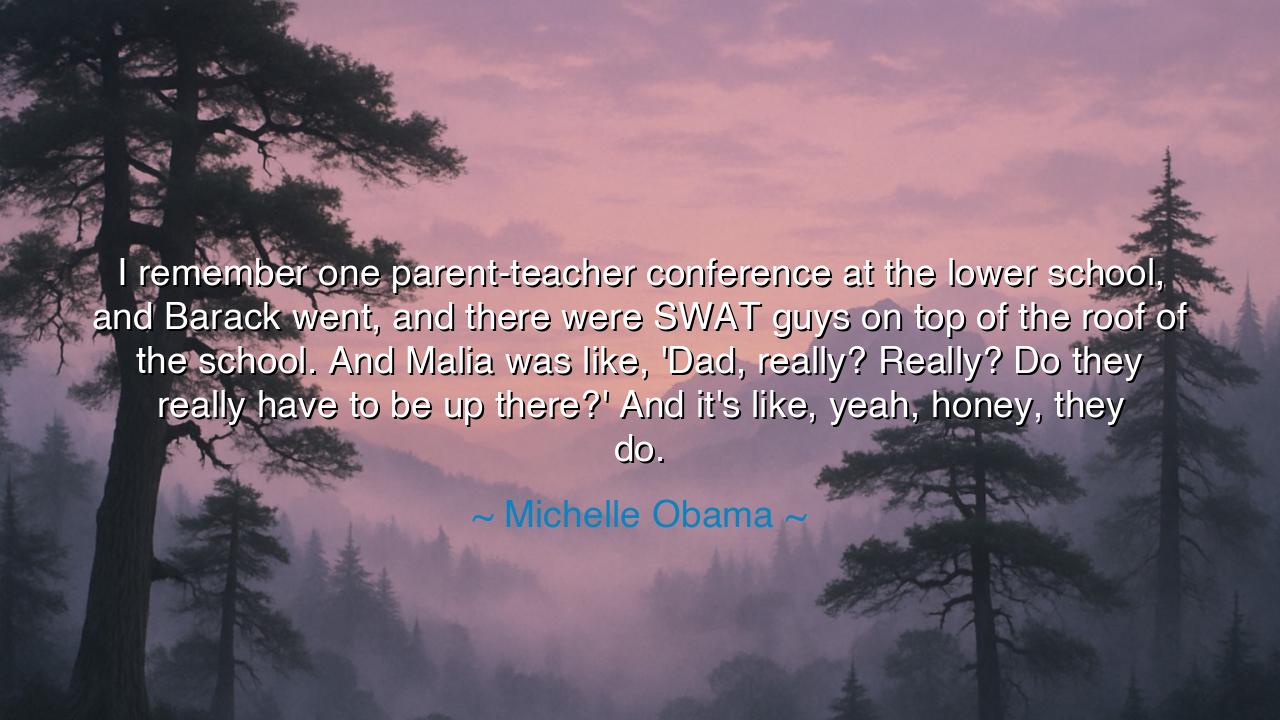
I remember one parent-teacher conference at the lower school, and
I remember one parent-teacher conference at the lower school, and Barack went, and there were SWAT guys on top of the roof of the school. And Malia was like, 'Dad, really? Really? Do they really have to be up there?' And it's like, yeah, honey, they do.






The words “I remember one parent-teacher conference at the lower school, and Barack went, and there were SWAT guys on top of the roof of the school. And Malia was like, ‘Dad, really? Really? Do they really have to be up there?’ And it's like, yeah, honey, they do,” spoken by Michelle Obama, capture in their simplicity the profound weight of power, responsibility, and the loss of ordinary life. Beneath the tenderness of a mother’s memory lies the quiet sorrow of a family forever changed by duty. What seems like a humorous recollection — a child’s innocent protest — is in truth a meditation on the cost of leadership, the burden of visibility, and the longing for normalcy amid the demands of greatness.
In this moment, the daughter’s question — “Do they really have to be up there?” — is the voice of purity, of a child yearning for an ordinary world. But the father’s quiet answer — “Yeah, honey, they do.” — speaks from the realm of duty, where innocence must bow before necessity. Barack Obama, as President, did not merely carry the authority of a nation; he bore the weight of its safety, its hopes, and its fears. Those guards on the rooftop were not symbols of grandeur, but of sacrifice — the constant reminder that leadership often means surrendering personal freedom for the sake of others. The scene reveals the invisible walls that surround those who serve — walls not of pride, but of protection and solitude.
To the ancients, this story would have been told as a parable of the burden of the crown. They would have said that every ruler, no matter how wise or benevolent, must live at a distance from the world he protects. The Emperor Marcus Aurelius, though revered for his wisdom, often wrote in his meditations of the loneliness of command — the impossibility of living as others do while bearing the duty to guide them. And yet, like the Obamas, he carried his humanity quietly within that isolation. The sight of the SWAT guards on the roof is no different from the sentries who once stood at the gates of Rome — a reminder that even the noblest service demands the sacrifice of the simple joys of life.
But there is also tenderness in Michelle’s recollection — the love of a mother watching her child wrestle with the strange realities of their family’s life. It is not bitterness that colors her words, but compassion. For she knows that every privilege carries its shadow, and that her daughters, though blessed, were also deprived of the ordinary freedoms that other children took for granted. In that single moment, she bears witness to a truth as old as civilization: that the families of those who serve also share in their sacrifices, even when they never asked to. This is not only the story of a president’s family — it is the story of all who live under the light of duty’s fire.
And yet, within this memory lies a lesson of perspective. The Obamas chose not to see their circumstances as imprisonment, but as a calling — a season of life that demanded strength, humility, and grace. Instead of shielding their daughters from the truth, they taught them to understand it: that the presence of danger is not a curse, but a measure of responsibility. Through that understanding, Malia and Sasha learned a wisdom that few children ever do — that safety, peace, and privilege are bought at the cost of vigilance and service. This is how the children of leaders grow into citizens of conscience, aware that freedom is never free.
In this way, Michelle’s story becomes a mirror to the ancient teaching: to serve greatly is to live differently. The higher one rises in duty, the more one must relinquish. But the greatness of the Obamas lies not in their power, but in their humanity — in their ability to remain parents, lovers, and listeners amid the storm of history. Even surrounded by guards and ceremony, they preserved the intimacy of a family, the laughter of a child, and the humility of ordinary love. In doing so, they proved that dignity is not found in distance, but in grace.
Let those who hear this story remember: every title, every position of honor, demands a price. When life calls you to lead — whether a family, a community, or a nation — do not seek comfort or applause, but the quiet strength to endure the unseen burdens. Like Barack and Michelle, accept that there will be guards on your rooftops — symbols of both the danger and the purpose of your path. And when your children ask, “Do they really have to be up there?” answer them with truth, gentleness, and wisdom. Tell them, “Yes, they do — because love must always stand watch over what it cherishes.”






AAdministratorAdministrator
Welcome, honored guests. Please leave a comment, we will respond soon